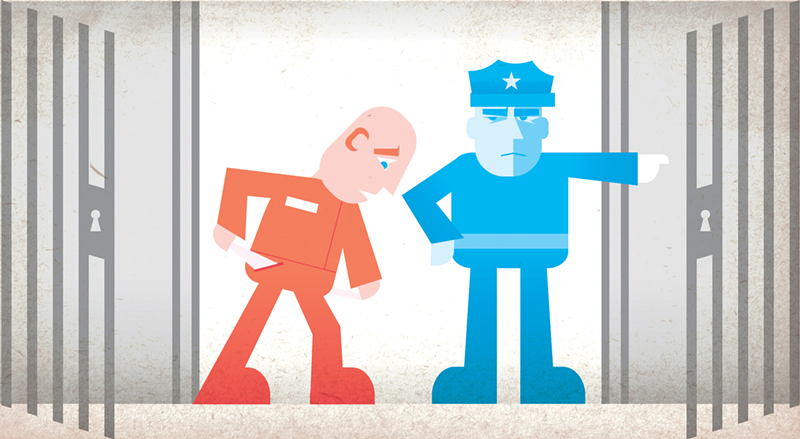F
or most people, being charged with a minor offense like speeding is often little more than an inconvenience. Sign a check, send off the ticket — then it’s tucked away into that portion of our brain, the “whoops” archive of our little misdoings. For others, though, it could literally change — or ruin — a life.
According to a new report from the American Civil Liberties Union of Ohio (ACLU Ohio) released on April 4, poor Ohioans are regularly victimized by illegal court practices across Ohio that effectively criminalize poverty by imprisoning people without the financial capacity to pay fines.
The 24-page report, titled The Outskirts of Hope, delineates how several courts across Ohio are unlawfully jailing people who can’t afford to pay court fines, often denying defendants their right to a hearing to determine if they’re financially capable of repayment.
It’s done through the use of modern-day “debtors’ prisons,” a system dating all the way back to ancient Mediterranean societies and the medieval practice of feudalism, when it was common to jail or enslave people to deal with unpaid debt.
Debtors’ prisons were prevalent in the United States until the 1800s; the practice was officially outlawed by the U.S. by Bearden v. Georgia, the landmark 1983 U.S. Supreme Court decision which ruled it unlawful to imprison someone for failure to pay a criminal fine unless the non-payment was “willful,” also upheld in the Ohio Constitution and Ohio Revised Code. That means that if a judge determines that an individual actually does have the financial resources available to pay a court fine but refuses to do so, he or she is subject to incarceration, not for actually failing to pay the fines but for willfully refusing to do so. The Ohio Revised Code mandates a defendant always has rights to a hearing to assess his or her indigence and ability to pay fines.
Should an offender in municipal court be financially unable to pay the fine, the jailing would technically be for a civil misdoing, not a criminal one. According to the ACLU, that’s not something that merits jail time, which is costly to the state of Ohio and taxpayers and unnecessarily detrimental to offenders, some of whom are jailed for debts as small as a few hundred dollars. The offense committed could be something as minor as allowing a dog to walk off its leash in public, according to Mike Brickner, ACLU Ohio’s director of communications.
The report examined 11 different counties in Ohio and found that courts in at least seven counties, including Bryan Municipal Court, Hamilton County Municipal Court, Mansfield Municipal Court, Parma Municipal Court, Sandusky Municipal Court, Springboro Mayor’s Court and Norwalk Municipal Court, were using some form of “debtors’ prison” practices by jailing people for not paying fines without the opportunity of a financial assessment hearing.
Brickner says Hamilton County Municipal Court was listed among the offenders based solely on flagrantly illegal language on its website. The misinformation on the site was apparently far outdated, according to Andy Gillen, assistant court administrator. Since the ACLU sent a letter to the court detailing the illegal language, it’s been removed to reflect accurate, legal policies. According to Hamilton County Public Defender attorney Lisa Ludwick, she’s never seen a financially unstable person incarcerated for inability to pay fines, and is confident local judges are acutely aware of the law.
That’s a relief for Hamilton County residents, but the problem is still a very real one, particularly in Ohio’s rural counties. In one finding, the ACLU points out that the staff at the Norwalk Municipal Court’s Clerk of Court Office in Huron County “openly admitted that whenever court records showed a person was incarcerated for ten days on a ‘contempt’ charge, this meant he or she had most likely been jailed for failure to pay fines.”
The ACLU’s investigation found that during a six-month period, 22 percent — more than one in five — of the total bookings at the Huron County Jail were related to failure to pay fines.
ACLU staff members also attended multiple contempt hearings in the Norwalk Municipal Court and found a pattern for dealing with non-payment at hearings, noting that “people facing jail time were informed of the total amount owed and, without any inquiry into their financial situations, assigned arbitrary monthly payment plans. At no time were they informed of their right to counsel. The court informed them that, if they did not stay current in these payment plans, they would be required to turn themselves in to jail on a specific date several months in the future.”
That’s where the pattern begins; if the fines weren’t paid and the individual didn’t report to jail, he or she would be taken to jail and incarcerated for 10 days with no bond. Ten days later, the individual would be released with an extra stack of fines involved in the arrest, creating more debt and often causing the cycle to repeat itself.
The number of people living in poverty grew by 57.7 percent in Ohio from 1999 to 2011, according to the report — a trend mirrored across the Midwest. The ACLU calls for courts to be more transparent in communicating defendants their rights, consistently hold hearings to assess defendants’ financial viability and “willfulness” to pay accumulated fines and provide retroactive debt credits to those wrongfully incarcerated based on circumstances of poverty.
Brickner says ACLU Ohio is scheduled to meet with Ohio Supreme Court Justice Maureen O’Connor on April 18, and he’s hopeful the Supreme Court will consider issuing statewide guidelines to make the laws clearer to judges across the state.
“With these 11 cases, we believe they’re just the tip of the iceberg,” says Brickner. ©






